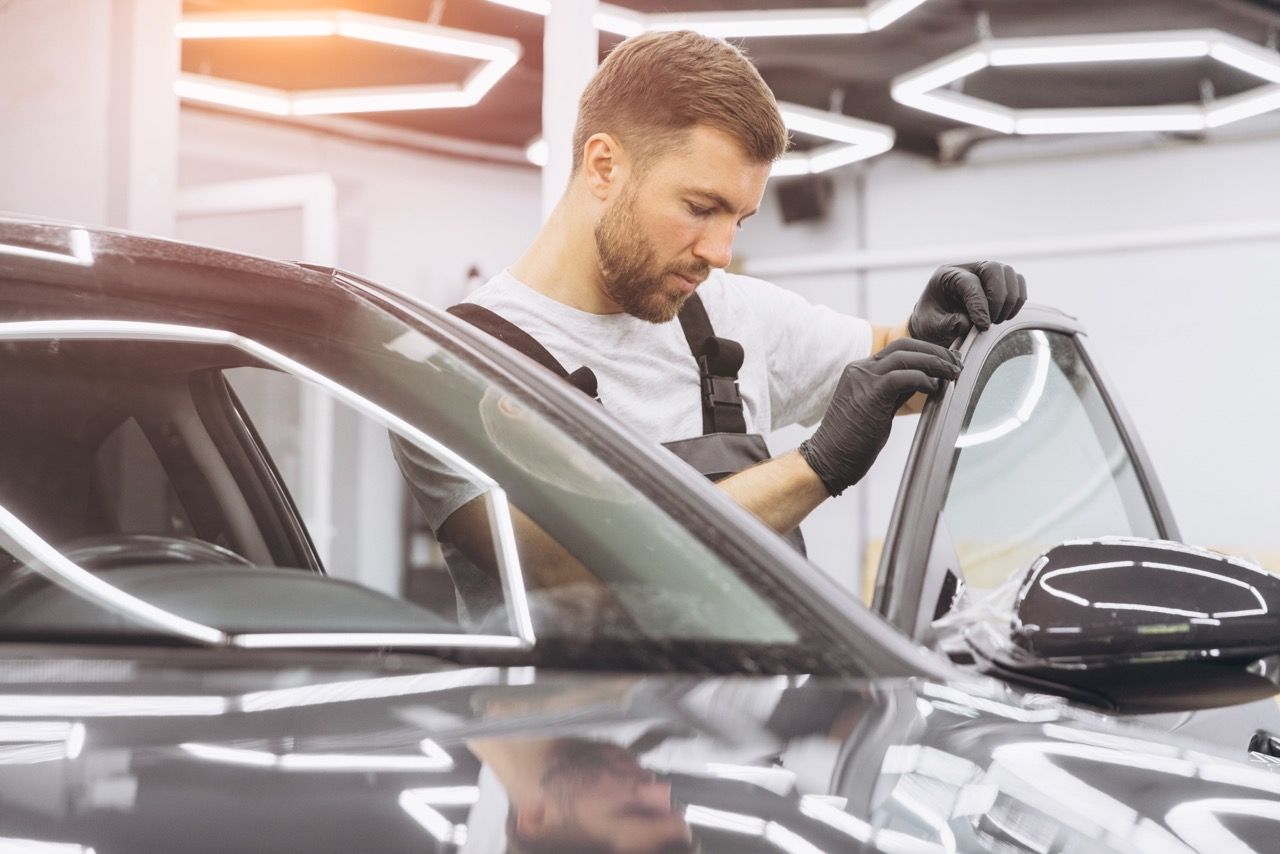Auto Window Tinting
EXPLORE OUR TINTING OPTIONS
From regular tint to advanced ceramic and nano-ceramic options, each choice provides tailored UV protection and IR heat reduction.
Standard Tint vs. Ceramic Tint
Standard Tint
99% UV Blocking
30-35% IR Heat Blocking
Affordable
Fades Over Time
Basic Protection
5-10 Years Longevity
Ceramic Tint
99% UV Blocking
60-80% IR Heat Blocking
Excellent Heat Rejection
Higher Cost
Clear and Durable
10-15 Years Longevity


















If you want a balanced, mid-grade film that’s affordable yet high-quality, this is it. It offers strong adhesive properties and perfectly complements the factory tint on most vehicles, ensuring great value.
Standard Tint
| Non-Reflective Black (shades): | 5% | 20% | 35% | 40% | 50% |
|---|---|---|---|---|---|
| Visible Light Transmittance | 4% | 19% | 35% | 39% | 48% |
| UV Rejection | 99% | 99% | 99% | 99% | 99% |
| Total Solar Energy Rejection | 43% | 39% | 36% | 33% | 30% |
Carbon IR is the ultimate solution for high heat rejection and color stability. Engineered with nanoparticles, it offers superior cooling without affecting electronic signals.
Carbon IR
| Carbon IR(shades): | 5% | 15% | 20% | 35% | 40% | 50% |
|---|---|---|---|---|---|---|
| Visible Light Transmittance | 5% | 15% | 20% | 35% | 43% | 48% |
| UV Rejection | 99% | 99% | 99% | 99% | 99% | 99% |
| IR Broad range (740-2500nm) | 62% | 48% | 44% | 35% | 27% | 38% |
| IRR @ 1025nm | 70% | 56% | 50% | 38% | 34% | 27% |
| Glare Reduction % | 93% | 83% | 76% | 59% | 54% | 44% |
| Total Solar Energy Rejection | 61% | 53% | 50% | 41% | 35% | 34% |
Regular tint blocks some UV rays but has limited heat rejection, while ceramic tint offers better UV and heat protection.
This advanced ceramic film, with 88% infrared heat rejection at 5% VLT, provides excellent heat reduction, keeping your vehicle cooler and more comfortable.
Ceramic IR
| Ceramic IR – Shades: | 5% | 15% | 20% | 35% | 40% | 50% | 70% |
|---|---|---|---|---|---|---|---|
| Visible Light Transmittance | 5% | 15% | 19% | 36% | 39% | 51% | 68% |
| UV Rejection | 99% | 99% | 99% | 99% | 99% | 99% | 99% |
| IRR Broad Range (740-2500nm) | 88% | 85% | 82% | 80% | 78% | 76% | 71% |
| IRR @ 1025nm | 75% | 73% | 72% | 75% | 73% | 70% | 73% |
| Glare Reduction % | 95% | 83% | 77% | 58% | 55% | 42% | 41% |
| Total Solar Energy Rejection | 65% | 60% | 55% | 50% | 47% | 43% | 35% |
Its metal-free design ensures clear signal reception and a rich, color-stable tone.
Ceramic PRO
| Ceramic PRO – Shades: | 5% | 15% | 20% | 35% | 40% | 50% | 70% |
|---|---|---|---|---|---|---|---|
| Visible Light Transmittance | 3% | 18% | 33% | 42% | 51% | 70% | 68% |
| UV Rejection | 99% | 99% | 99% | 99% | 99% | 99% | 99% |
| IRR Broad Range (740-2500nm) | 88% | 85% | 82% | 80% | 78% | 76% | 71% |
| IRR @ 1025nm | 75% | 73% | 72% | 75% | 73% | 70% | 73% |
| Glare Reduction % | 95% | 83% | 77% | 58% | 55% | 42% | 41% |
| Total Solar Energy Rejection | 66% | 62% | 58% | 53% | 51% | 51% | 35% |
SHIELD YOUR INTERIOR WITH ULTIMATE ENERGY EFFICIENCY

Block 80-95% Infrared Heat
with Ceramic PLUS
Long-lasting benefits and superior heat rejection make it an excellent investment for ultimate comfort and vehicle preservation.
With exceptional heat rejection and the advanced reliability of embedded nanoparticles, this film checks all the boxes.
Ceramic PLUS
| Ceramic PLUS (shades): | 5% | 15% | 20% | 35% | 50% | 70% | 70% |
|---|---|---|---|---|---|---|---|
| Visible Light Transmittance | 5% | 15% | 19% | 36% | 51% | 68% | 68% |
| UV Rejection | 99% | 99% | 99% | 99% | 99% | 99% | 99% |
| IRR Broad Range (740-2500nm) | 96% | 95% | 94% | 96% | 95% | 95% | 71% |
| IRR @ 1025nm | 93% | 90% | 93% | 94% | 92% | 91% | 73% |
| Glare Reduction % | 94% | 84% | 78% | 63% | 44% | 23% | 41% |
| Total Solar Energy Rejection | 69% | 65% | 63% | 61% | 55% | 48% | 35% |
FAQs
Explore our selection of regular, ceramic, and nano-ceramic tints, each providing distinct benefits and features to empower you in making the best choice for your vehicle.
How long does each type of tint last?
Regular tint can last 5-10 years, ceramic tint can last 10-15 years, and nano-ceramic tint offers longevity of 15+ years, depending on maintenance and environmental conditions.
Is professional installation necessary for optimal results?
While DIY options exist, professional installation ensures proper application and alignment, reducing the risk of bubbles, peeling, or distortion.
What are the legal limits for tint darkness in Texas?
In Texas, the front windshield must allow at least 25% of light in, while the front side windows should also permit a minimum of 25% visible light transmission.
To ensure compliance, work with a certified tinting professional familiar with Texas laws and consider having your windows tested with a light meter for accurate measurements.
Will window tint affect my visibility while driving?
High-quality tints are designed to maintain visibility while reducing glare and heat. However, darker tints may affect visibility in low-light conditions.
Is PPF self-healing?
Yes, most premium PPFs have self-healing properties, meaning minor scratches and swirls disappear when exposed to heat, keeping your car looking flawless.
What maintenance is required for each type of tint?
Regular cleaning with non-abrasive materials and avoiding harsh chemicals is essential. Ceramic and nano-ceramic tints may require less frequent maintenance due to their durability.
Our Gallery
Explore our stunning gallery showcasing the transformative power of our car detailing and tinting services.
Request A Free Quote!
We will get back to you as soon as possible.
Please try again later.
Consult us
Schedule a consultation with our experts to craft a bespoke solution for your luxury car or architectural tinting.